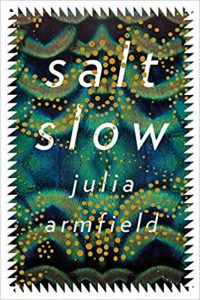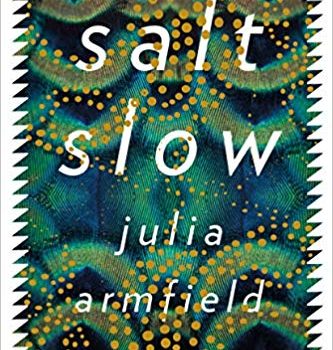Ian Mond Reviews Salt Slow by Julia Armfield
 Salt Slow, Julia Armfield (Picador 978-1529012569, £12.99, 208pp, hc) May 2019. (Flatiron 978-1250224774, $24.99, 208pp, hc) October 2019.
Salt Slow, Julia Armfield (Picador 978-1529012569, £12.99, 208pp, hc) May 2019. (Flatiron 978-1250224774, $24.99, 208pp, hc) October 2019.
As chaotic as things are at the moment, the last couple of years have been an excellent time for the publication of debut collections, written by women, that explore feminist and intersectional issues through a speculative lens. This includes (and these are just the ones I’ve read, so it’s nowhere near an exhaustive list): Belly Up by Rita Bullwinkel, Heads of the Colored People by Nafissa Thompson-Spires, What It Means When a Man Falls from the Sky by Lesley Nneka Armiah, and the extraordinary Her Body and Other Parties by Carmen Maria Machado. Julia Armfield’s debut collection Salt Slow is a new entry to this list.
In the collection’s opening story, “Mantis”, a young girl describes the physical changes she’s going through, including shedding her skin, losing her teeth, and experiencing dreams “shot through with shouts of violence.” At the same time, she has to navigate the cliquey environment of a Catholic girl’s school and endless conversations about boys. The narrator’s transformation and her final apotheosis – even if it is undercut by the title – is a visceral treat. But as a story about a girl’s transition from child to adult, the fantastic element provides very little that’s fresh or insightful. I had a similar reaction to the third piece in the collection, “The Collectables”, where Jenny, recently dumped by her boyfriend, decides to build the perfect man in the cellar of the house she shares with two friends. The story makes no bones of its Hammer Horror influences, and I appreciated Armfield’s word choices – I like how, at one point, she describes Jenny as “poltergeisting around the house” – but the unfolding plot is not horrific or weird enough to make up for a heavily foreshadowed and predictable ending. Armfield is far more successful with “Stop Your Women’s Ears with Wax”, her take on a ’80s horror cliché: the occult rock-and-roll band. She turns the well-worn idea on its head by having the band be an all-female group. As they tour from city to city, their performances (that no-one can entirely recall) transform excited teenage girls into savage predators, ripping apart any man that comes within their vicinity. It’s a delightfully vicious and schlocky story that gave me nostalgic flashbacks to my misbegotten Splatterpunk youth.
Aside from reworking old genre tropes, a recurring theme in the collection is Armfield’s less-than-positive attitude to relationships between men and women. “Smack”, for example, is a compelling portrait of a woman going through an acrimonious divorce. The protagonist’s diminished sense of self, a product of her childhood that extends through to a psychologically abusive marriage, sees her hole up in her soon-to-be-ex-husband’s holiday home – her one act of defiance. In “Granite” (another title that spoils the ending) Armfield highlights the emotional inequality between men and women. The story’s conceit is that men turn into stone if a woman fails to love them correctly. As explained to our protagonist, Maggie, by a group of women well aware of this phenomena:
It’s a design flaw… Not their fault, exactly. Isn’t to say that you can’t love them, just that you have to be careful doing it.
The stories that resonated with me the most were those where the speculative or off-kilter element is as much a metaphor as it is an integral aspect of the plot. This is the case with the title story “Salt Slow”, where a drowned world overflowing with grotesque and mutated marine-life lends itself to an unvarnished and, at times, disturbing look at the difficulties of becoming pregnant, the anguish of a miscarriage, and the pain of childbirth. Then there’s “The Great Awake”, which features the creepy premise of people losing the ability to sleep, their insomnia anthropomorphised into a slender, ghostly figure that follows them around. Here, unlike some of the other tales in the book, Armfield commits to the world-building, working through what it would mean for people to be always awake, to be haunted by their sleep, to be continuously reminded of what they’re incapable of. My favourite piece is “Formerly Feral”, a coming-of-age story about a rebellious teen who befriends Helen, her step-mother’s adopted wolf. As with so much of the collection, this is a story about a relationship, this time between siblings where one happens to have fur and sharp, bitey teeth. But what marks “Formerly Feral” out from those other pieces is that the relationship, while initially fractious, develops into something warm and loving, unburdened by expectations.
While I wasn’t always convinced by Armfield’s use of the fantastic (even in stories I enjoyed, such as “Granite”), her distinctive, elegant prose articulates the anxieties of living in a mostly heteronormative society. I’m sure it’s no accident that the one supportive relationship in the collection (not involving a wolf) is between two women. I’m also sure it’s no accident that as a cis-gendered male, I found reading these stories, at times, to be an unsettling experience. Salt Slow is a strong debut, only reinforcing that we are in a golden age of female-led and female-centric collections with a genre flavour.
Ian Mond loves to talk about books. For eight years he co-hosted a book podcast, The Writer and the Critic, with Kirstyn McDermott. Recently he has revived his blog, The Hysterical Hamster, and is again posting mostly vulgar reviews on an eclectic range of literary and genre novels. You can also follow Ian on Twitter (@Mondyboy) or contact him at mondyboy74@gmail.com.
This review and more like it in the October 2019 issue of Locus.
 While you are here, please take a moment to support Locus with a one-time or recurring donation. We rely on reader donations to keep the magazine and site going, and would like to keep the site paywall free, but WE NEED YOUR FINANCIAL SUPPORT to continue quality coverage of the science fiction and fantasy field.
While you are here, please take a moment to support Locus with a one-time or recurring donation. We rely on reader donations to keep the magazine and site going, and would like to keep the site paywall free, but WE NEED YOUR FINANCIAL SUPPORT to continue quality coverage of the science fiction and fantasy field.






